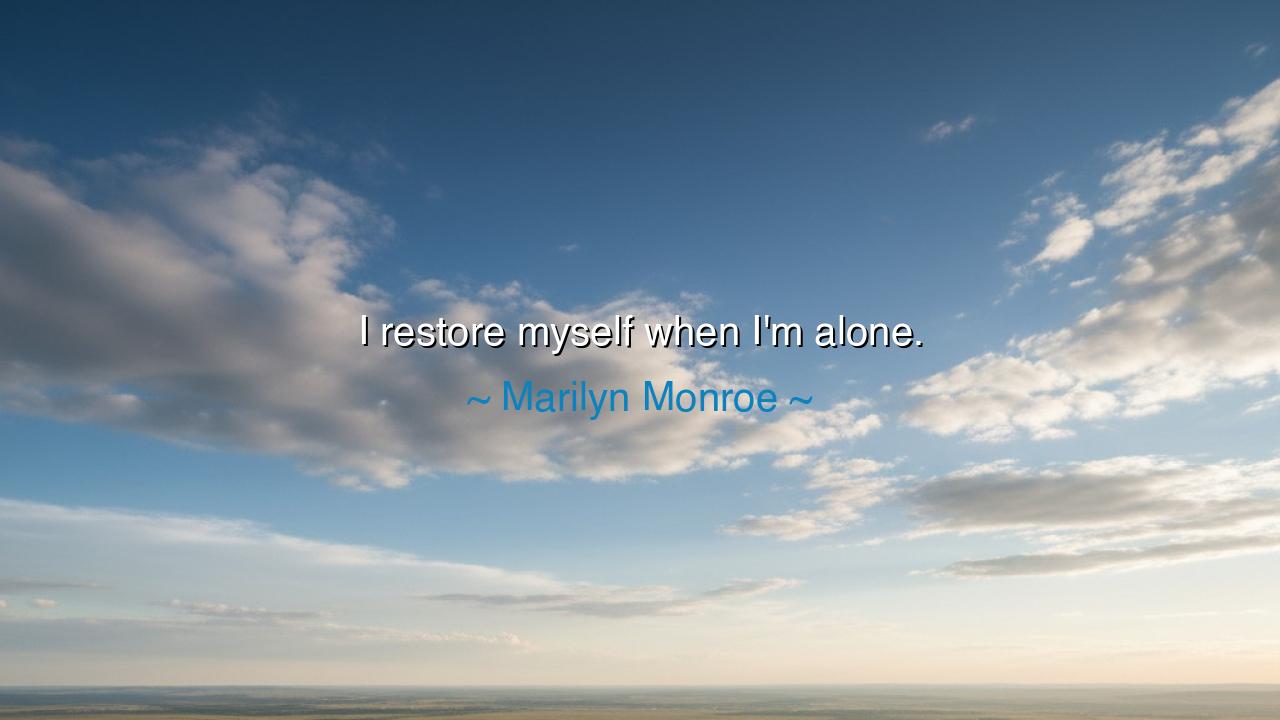
I restore myself when I'm alone.






"I restore myself when I'm alone." These words from Marilyn Monroe carry a profound truth about the transformative power of solitude. In a world that often values social interaction, achievement, and the validation of others, Monroe’s reflection is a gentle yet powerful reminder that true restoration comes not from external sources, but from the inner quiet found in solitude. To restore oneself is to reconnect with one’s own essence, free from the distractions and expectations of the world. Monroe's statement speaks not only to the need for physical rest, but to the deeper, more spiritual healing that occurs when we are allowed to be alone with our thoughts, our emotions, and our inner world.
Throughout history, the concept of solitude has been revered as a powerful tool for self-reflection and restoration. The ancient philosophers knew well the necessity of stepping away from the noise of the world to examine the soul and refresh the spirit. Socrates, who spent much of his life engaging in philosophical dialogue, also understood the need for solitude to achieve true wisdom. He spent time alone to reflect on his teachings and challenge his own assumptions. It was in these quiet moments that he could engage in the deepest self-examination, free from external influence. Monroe’s sentiment mirrors this ancient wisdom: it is in the solitary moments that we find our way back to ourselves, away from the distractions of fame, opinion, and the hustle of daily life.
The great philosopher Seneca, a Stoic, wrote extensively about the importance of solitude for cultivating inner peace and wisdom. He believed that by withdrawing from the constant demands of society, we could regain our clarity and sense of purpose. Seneca, though deeply involved in politics and governance, often retreated to quiet places for the sake of reflection and rejuvenation. He understood that the busy nature of the world often clouds the mind, leaving little space for the deep reflection necessary to restore the soul. Monroe’s words echo this idea—solitude is not just an escape from the world, but a renewal, a time for the mind and soul to reclaim their strength.
Consider also the life of Leonardo da Vinci, a man whose genius was unparalleled, yet whose most profound works were born from moments of solitude. Da Vinci’s artistic creations, scientific innovations, and philosophical musings were often conceived in private, in the quiet spaces of his own thoughts. His notebooks are filled with sketches and reflections, captured in times when he sought the quietude to recharge and restore his creative energy. Like Monroe, da Vinci found his strength in moments of solitary reflection, away from the demands of the world. It is in these times that our most profound insights and creative sparks arise—when we allow the mind to settle and the soul to breathe.
Monroe’s quote also speaks to the internal struggles that many, especially those in the public eye, experience. Fame can create an illusion of constant connection, but it can also foster an acute sense of loneliness and alienation. The demands of others, the expectations placed upon us, and the constant scrutiny can drain the spirit. Monroe, beloved by millions but often misunderstood, found that solitude was her refuge, her means of restoring herself amidst the tumult of her public life. In a world that constantly pulls at us from every direction, the ability to retreat and find solace in one’s own company is not just an act of self-care—it is an act of personal sovereignty.
The lesson we can take from Monroe’s words is both simple and profound: solitude is not a luxury, but a necessity. In our fast-paced, connected world, we often forget the power of taking a step back to reconnect with ourselves. Like Socrates, Seneca, and da Vinci, we must learn to embrace the quiet spaces in our lives, to step away from the noise and demands of the external world in order to restore our energy, clarity, and purpose. It is only when we are alone that we can truly hear the whispers of our own hearts, the call of our inner wisdom.
In practical terms, this means setting aside time each day or week to be in solitude, whether through meditation, journaling, or simply being alone in nature. These moments are not wasted; they are the spaces in which we recharge, allowing us to return to the world with a renewed sense of strength, clarity, and creativity. It is in these quiet moments that we can reflect on our lives, make sense of our emotions, and reconnect with the truth of who we are. By embracing solitude, we become whole again, restoring the parts of ourselves that get lost in the noise of the world.
In conclusion, Marilyn Monroe’s words remind us that in moments of solitude, we find not loneliness, but the restoration of our souls. Just as the great philosophers, artists, and thinkers of history found their greatest insights in times of reflection and solitude, so too must we learn to embrace these quiet moments as essential to our well-being. In solitude, we regain our strength, our clarity, and our purpose, allowing us to return to the world with renewed energy and a deeper connection to our true selves. Let us, therefore, seek solitude not as an escape, but as a means of reclaiming our power and vitality, and in doing so, restore the fullness of who we are.






AAdministratorAdministrator
Welcome, honored guests. Please leave a comment, we will respond soon